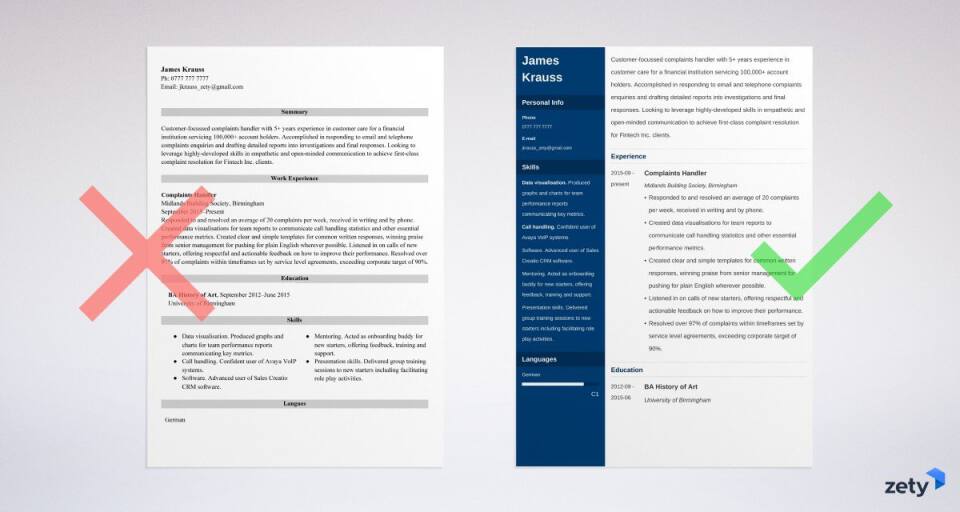10+ Communication Skills for Career and CV Success
Create your CV nowGood communication skills are a non-negotiable for workplace success. Every situation that involves interacting with and sharing information with other people requires effective communication skills.
But with such a broad remit it can be tough to define exactly what communication skills are and how to best make use of them to advance your career. So we’ve narrowed it down to make your job easier.
Read on and you’ll see the most important communication skills examples for the workplace, learn how to include them on your CV and get useful tips on how to improve your communication skills too.
Want to save time and have your CV ready in 5 minutes? Try our CV builder. It’s fast and easy to use. Plus, you’ll get ready-made content to add with one click. See 20+ CV templates and create your CV here.
Sample CV made with our builder—See more CV examples here.
CV Communication Skills Example
James Krauss
Ph: 0777 777 7777
Email: jkrauss_zety@gmail.com
Customer-focussed complaints handler with 5+ years experience in customer care for a financial institution servicing 100,000+ account holders. Accomplished in responding to email and telephone complaints enquiries and drafting detailed reports into investigations and final responses. Looking to leverage highly-developed skills in empathetic and open-minded communication to achieve first-class complaint resolution for Fintech Inc. clients.
Work Experience
Complaints Handler
Midlands Building Society, Birmingham
September 2015–Present
- Responded to and resolved an average of 20 complaints per week, received in writing and by phone.
- Created data visualisations for team reports to communicate call handling statistics and other essential performance metrics.
- Created clear and simple templates for common written responses, winning praise from senior management for pushing for plain English wherever possible.
- Listened in on calls of new starters, offering respectful and actionable feedback on how to improve their performance.
- Resolved over 97% of complaints within timeframes set by service level agreements, exceeding corporate target of 90%.
Education
BA History of Art, September 2012–June 2015
University of Birmingham
Skills
- Data visualisation. Produced graphs and charts for team performance reports communicating key metrics.
- Call handling. Confident user of Avaya VoIP systems.
- Software. Advanced user of Sales Creatio CRM software.
- Mentoring. Acted as onboarding buddy for new starters, offering feedback, training and support.
- Presentation skills. Delivered group training sessions to new starters including facilitating role play activities.
Languages
- German—C1
What Are Communication Skills?
Communication skills are the abilities that allow us to convey information to other people. They involve speaking, listening and empathising in order to share ideas and data, understand the emotional state of others and respond appropriately according to the situation.
Having effective communication skills is an important element of success in the workplace, regardless of your career. They’re also considered a classic example of a soft skill, in that they relate to the way you interact with other people.
Top 10 Communications Skills Examples
Here are some examples of the most important skills for effective communication in the workplace.
1. Written Communication Skills
It’s a broad category, covering everything from a casual email between colleagues to writing an in-depth annual report outlining every aspect of an organisation’s performance. Here are just a few examples of the most important skills in written communication.
Office Suites and Productivity Tools
This is also a hard skill that may seem more at home when discussing computer skills but using office suites is an unavoidable part of working life. The most popular examples are Microsoft Office and Google Workspace. In many jobs, most of the written communication produced takes place through the software in these suites, so knowing how to use them effectively is essential.
Grammar and Spelling
It should go without saying that professional communication should always be error free. After all, you don’t want to trigger an existential crisis by writing a sign saying ‘All Employees Must Wash Hands Before Living’. But in all seriousness, grammar and spelling mistakes will undermine your credibility with customers and colleagues alike. Our own research revealed that, for example, 75% of people think spelling mistakes in emails are unacceptable.
So make use of inbuilt spell checkers and apps like Grammarly to keep your written communication free of mistakes. This is particularly important when writing your CV but even more personal communication can affect your job hunt. Yougov research revealed that 56% of employers say that bad spelling and grammar on a candidate’s social media account could jeopardise their chances of being hired.
Clarity
It’s essential that your writing is easily understood. Don’t use a hundred words when ten will do and don’t over complicate matters with unnecessary jargon and corporate buzzwords. Take a look at the crystal clear Plain English Campaign to learn more, and try out the Hemingway app to help cut the fat out of your writing.
Tone
This refers to the way the ‘voice’ of your writing and the way it changes with different situations. A response to an official complaint from a customer will have a much more formal tone than a quick email between colleagues. If you get the tone wrong you can trigger negative feelings in the recipient. That has an impact on achieving your objectives as the recipient will be less keen to work with you.
2. Enunciation
Verbal communication is also essential, and being able to speak clearly and be understood easily is a valuable workplace skill. Other aspects of the way you speak can affect your job prospects too. One widely reported study by UK publisher Pearson found 56% of employers say using an upward inflection when you speak could damage your professional credibility. Upward inflection means raising your voice at the end of a sentence to make a statement sound like a question. So be aware of the spoken word at work too.
3. Questioning
Another vital spoken communication skill is the ability to ask questions effectively. They help to clarify information you’re not sure of and elicit information that you require. Use a mixture of open and closed questions to obtain the information you need. A closed question usually generates a simple, yes or no response e.g. ‘Are you feeling better today?’. Whereas an open question allows the speaker to give more detail e.g. ‘How are you feeling today?’.
4. Listening
Communication is a two-way street, it’s just as important to be able to receive information as it is to transmit it yourself. If you aren’t a good listener you won’t be able to follow directions or understand the perspective of other people.
That’s why active listening is an excellent communication skill to cultivate. Pay close attention, reflect back what you’re being told and ask questions to clarify if you’re unsure. That way you sharpen up your understanding and respond more appropriately.
5. Non-Verbal Communication
It’s often said that 93% of communication is non-verbal. It’s now accepted that figure is something of an urban legend based on a misunderstanding of research, but it’s definitely true that a large part of communication is non-verbal. Body language and facial expression are among the most important features of non-verbal communication.
Maintain eye-contact, a relaxed and open stance and a friendly or neutral tone of voice. And pay attention to cues from those you’re communicating with so you can understand their emotions and behaviour and respond appropriately.
6. Confidence
Inspiring confidence in your colleagues and managers is another essential communication skill. It shows you have the courage of your convictions and that you’ll complete your tasks reliably. As with non-verbal communication, maintain good eye contact and make sure your tone is firm but friendly and not aggressive or arrogant. Confidence is also one of the most important leadership skills.
7. Empathy
Empathy helps us understand others when they communicate with us and to shape our own communication appropriately when we respond. Empathy also builds trust and strengthens relationships with colleagues and bosses. This makes it one of the most effective communication skills for success in the workplace.
Always consider the emotional state and needs of others. Respond appropriately when speaking too. A simple phrase such as ‘I understand why you feel like that’ goes a long way to building empathy. Taking an empathetic approach ultimately makes it easier to come up with mutually acceptable solutions to challenges at work.
8. Feedback
This is a particularly important communication skill for managers and leaders. The success of a business depends upon giving employees regular and constructive feedback. This is so they can recognise areas for improvement but also to increase motivation by recognising a job well done.
Receiving feedback is also an important skill. Make use of your active listening skills, ask questions and clarify so you can help build your own skills and experience and contribute more effectively to your employer.
9. Open-Mindedness
Working with fixed assumptions won’t do you any favours at work. Keep an open mind when you enter into a spoken or written dialogue with colleagues or customers. Avoid making assumptions and actually listen to and try to understand the other person’s point of view even if you disagree. This allows you to come up with critical and rational responses and take onboard new ideas and perspectives. So open-mindedness will help you to think outside the box, come up with innovative solutions and help build respect with those around you.
10. Visual Communication Skills
A list of examples of good communication skills for the workplace wouldn’t be complete without discussing visual communication. Apart from conveying information through writing and speaking it’s increasingly important to be able to communicate by using pictures, charts and graphics. Master the art of visual communication and you’re much more likely to get your point across too. That’s because an estimated 65% of people are visual learners. So throwing in a few visual aids really helps people to understand what you’re saying.
These also tend to be very specific skills that are easy to list on your CV. Here’s a few examples.
- Graphic design
- Photography
- Image editing
- Typography and page layout design
- Data visualisation
- UX design
- Graphs and charts
- Slide presentations
And speaking of your CV, now let's take a look at what to include in your CV to effectively showcase your communication skills.
Making a CV with our builder is incredibly simple. Follow our step-by-step guide, use ready-made content tailored to your job and have a CV ready in minutes.
When you’re done, Zety’s CV builder will score your CV and tell you exactly how to make it better.
How to Include Communication Skills on Your CV
Regardless of the job you’re applying for, having good communication skills will work in your favour. But you need to be able to prove it when you write your CV, which is an important communication skill in itself. So let’s go through a standard chronological CV format section-by-section to see how it’s done.
Personal Profile
Also known as a CV summary, your personal profile is the brief introductory statement that tells the recruiter who you are and what you have to offer to the employer. It gives you an opportunity to establish your communication skills right from the outset. Here’s an example.
Customer-focussed complaints handler with 5+ years experience in customer care for a financial institution servicing 100,000+ account holders. Accomplished in responding to email and telephone complaints enquiries and drafting detailed reports into investigations and final responses. Looking to leverage highly-developed skills in empathetic and open-minded communication to achieve first-class complaints resolution for Fintech Inc. clients.
Work Experience
Your CV work experience section lets you show how you’ve used your communication skills to achieve success in the workplace. Here’s how to do it.
- Mention achievements that you’ve accomplished as a result of your communication skills.
- Don’t just say what you did, but prove how well you did, quantifying your achievements with numbers and using accomplishment statements.
- Use action words to start off each bullet point for extra impact. Good action verbs that signify communication include composed, formulated and persuaded.
Complaints Handler
Midlands Building Society, Birmingham
September 2015–Present
- Responded to and resolved an average of 20 complaints per week, received in writing and by phone.
- Created data visualisations for team reports to communicate call handling statistics and other essential performance metrics.
- Created clear and simple templates for common written responses, winning praise from senior management for pushing for plain English wherever possible.
- Listened in on calls of new starters, offering respectful and actionable feedback on how to improve their performance.
- Resolved over 97% of complaints within timeframes set by service level agreements, exceeding corporate target of 90%.
Education
If you’re writing a school leaver CV or a graduate CV, chances are you won’t have much professional experience to write about. But by adding extra detail to your CV education section you can have the opportunity to show off your general communication skills. Add some bullet points and mention specific modules or extracurricular activities that prove your communication abilities.
BA History of Art, September 2012–June 2015
University of Birmingham
- President and active participant of University of Birmingham Toastmasters
Skills Section
This is the obvious place to include your communication skills but with a little thought you can give your CV skills section maximum impact. Here’s how.
- Tailor it. It’s not good enough to use the same skills list for every application, you need to specifically target each new job you apply for. Do this by reading the job advert, noting the skills required and then choosing from your own skill set to match the job requirements as closely as possible.
- Add detail. Add a sentence to each skill explaining how you demonstrate it. It has more impact than just a plain list of skills.
Skills
- Data visualisation. Produced graphs and charts for team performance reports communicating key metrics.
- Call handling. Confident user of Avaya VoIP systems.
- Software. Advanced user of Sales Creatio CRM software.
- Mentoring. Acted as onboarding buddy for new starters, offering feedback, training and support.
- Presentation skills. Delivered group training sessions to new starters including facilitating role play activities.
Additional Sections
Showing that you have strong communication skills doesn’t end with your skills section. Adding extra sections to your CV is something we always recommend as it helps to make you stand out as a candidate. Use this opportunity to add even more proof of your communication abilities. Here are some ideas.
- Include a languages section. Being fluent in a foreign language is a specialist communication skill in itself.
- Mention hobbies and interests on your CV. It’s an incredibly underestimated addition, but it can provide solid proof of communication skills. Mentoring and coaching are two great examples that prove you’ve got good interpersonal communication skills.
- Other ideas include projects, awards and certificates.
Languages
- German—C1
How to Improve Communication Skills
What if you don’t think your communication skills are up to scratch? Don’t despair, because there are more opportunities than ever before to improve them. Communication skills are consistently ranked as one of the top areas where soft skills are missing. So a lot of work is being put into addressing this through specialised training. Here a few ideas on how to improve your communication skills.
1. Ask Your Employer
Increasingly, employers offer various training options for their staff. Check with your manager or HR team to see what’s available.
2. Research Online Training
There is an ever increasing number of online learning programmes available. From specialist online training providers like Coursera and Udemy to traditional educational institutions, there’s a wealth of training opportunities at your fingertips
3. Check Out Government-Led Training Schemes
The career skills and training service also has many options available. This option is particularly useful for candidates who aren’t currently employed.
4. Practise at Work
Put your knowledge into action and get feedback from colleagues and bosses. And try to take on new responsibilities that allow you to practice and improve upon your existing communication skills.
Plus, a great cover letter that matches your CV will give you an advantage over other candidates. You can write it in our cover letter builder here. Here's what it may look like:
See more cover letter templates and start writing.
Thanks for reading.
About Zety’s Editorial Process
Our editorial team has thoroughly reviewed this article to ensure it follows Zety’s editorial guidelines. Our dedication lies in sharing our expertise and providing you with actionable career advice that offers you real value. Every year, the quality of our content attracts 40 million readers to our site. But that’s not all – we conduct original research to gain a detailed understanding of the labour market. We take pride in being cited by top universities and leading media outlets in the UK and worldwide.
Sources
- David Lapakko, Communication is 93% Nonverbal: An Urban Legend Proliferates
- Regine Zopf et al., Attentional modulation of the human somatosensory evoked potential in a trial-by-trial spatial cueing and sustained spatial attention task measured with high density 128 channels EEG
- Action Verbs for Résumés | Lawrence University
- Soft skills for a hard world | McKinsey
- Career skills and training | GOV.UK






